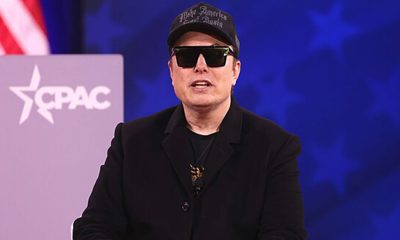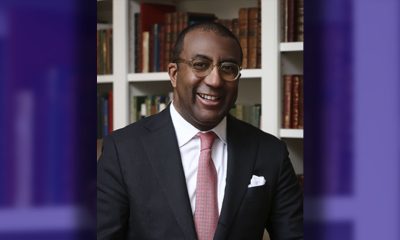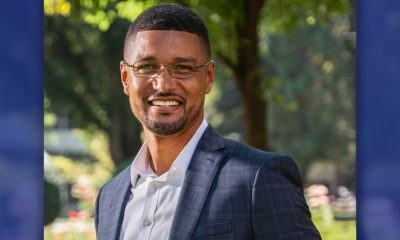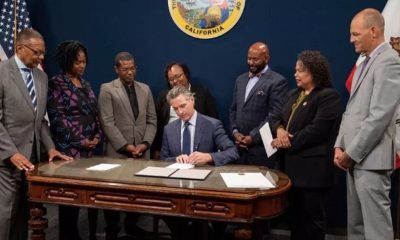Politics
Black Republican Opponent Expected to Defeat Stockton’s Popular Democratic Mayor Michael Tubbs
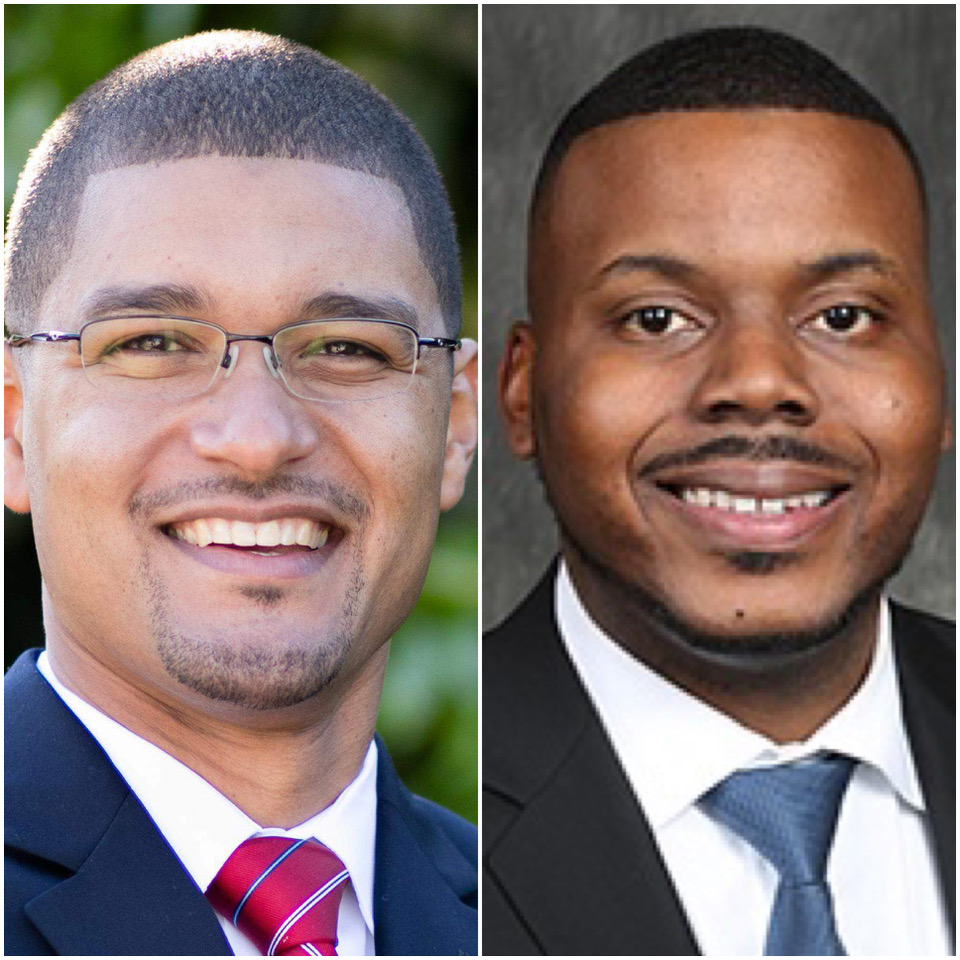
In 2012, Stockton, California, elected 22-year-old Michael Tubbs to his hometown’s city council.
From that celebrated victory to his 2017 rise to mayor of the Central Valley city, media pundits and Democratic Party insiders have hailed Tubbs, calling him one of the Democratic Party’s rising stars.
Tubbs’s future as a force in the Democratic party still remains almost certain, but on Nov. 3, the 30-year-old Stanford grad suffered an unexpected blow. As of Friday, Nov. 13, Tubbs was trailing Republican challenger Kevin Lincoln in his reelection bid.
Lincoln, who has never held political office, was leading Tubbs by almost 4,000 votes. Lincoln currently has 43,751 votes (55.05%) to Tubbs’s 35,724 votes (44.95%), with more ballots to be counted.
With this loss, Tubbs, the 79th mayor of the seat of San Joaquin County, joins a club of one-term Stockton mayors who couldn’t pull off a run for a second term.
Edward Chavez (2005 – 2008), Ann Johnston (2009 – 2012), and Anthony Silva (2013 – 2016) were all one-term mayors of the San Joaquin River port city.
“Over the last four years we have built a solid foundation towards a better future,” Tubbs said in a written statement. “It is my hope to continue this work as (Stockton’s) mayor. However, before anyone can declare a victory, each and every vote must be counted.”
When he was elected in 2016, Tubbs, then 26, became the youngest mayor in Stockton’s history and the first Black person to claim the seat.
Tubbs’s opponent is also Black. Lincoln’s grandfather, an immigrant from Mexico who came to California and settled in South Stockton, raised his family there and became a United States citizen.
Lincoln, who was born in Stockton, grew up in a U.S. Army family. As a youth, he volunteered at the California Youth Authority where he spoke to and encouraged youth in the juvenile justice system.
For now, Lincoln is excited about his lead, but cautious.
“There are definitely more votes to be counted and we’re definitely not counting our chickens before they hatch,” Lincoln said. “We still feel really good.”
Stockton has a population of 312,697 residents, according to the 2019 U.S. Census. An estimated 35,548 residents (12.2%) of Stockton are African American.
Even as he faces a career-derailing loss, Tubbs can look back on a record full 0f accomplishments and a personal
contact list of heavy hitters. He made both national and California history as the youngest mayor who has led a city with a population of over 100,000 residents.
Fortune magazine honored Tubbs among its 2018 Top “40 under 40,” and he made Forbes’ 2018 list of the “30 Under 30.” He was also celebrated that year among the “Root 100,” that publication’s annual list of influential African American achievers.
The Sacramento Observer, California capital city’s oldest African American-owned newspaper, has also celebrated Tubbs among its own “30 Under 30” award recipients.
Tubbs also has close and longstanding relationships with former U.S. President Barack Obama and entertainment mogul Oprah Winfrey. He also served as one of billionaire Michael Bloomberg’s surrogates when the New York businessman was running for president.
HBO released a documentary, “Stockton On My Mind,” featuring Tubbs, then a millennial, who was born to a teenage mother and father who spent some time in prison.
Some political observers say that Tubbs’s perceived star status on the national scene may have distracted him from paying close attention to political priorities at home.
“The mayor may have too much star power and may or may not be sufficiently focused on doing the work in Stockton,” Brian Clark, associate professor of political science at Stockton’s University of Pacific.
Other Stockton residents say Tubbs ran afoul of the will of local voters when he recommended selling one of the city’s 70-year-old golf course to a private operator.
Meanwhile, the national media praised Tubbs for launching the Economic Security Project, the nation’s first municipal-level basic income pilot. About 125 people in high-poverty areas were randomly picked to receive $500 monthly in cash to help with unaffordable expenses.
The program is expected to end in January 2021. Billionaire and Twitter Chief Executive Officer Jack Dorsey donated $3 million to Tubbs’ “universal basic income” program.
As a council member, Tubbs created the Reinvent South Stockton Coalition, championed the creation of the City’s Office of Violence Prevention, and was part of the council that led the city out of bankruptcy as Chair of the Audit and Legislative Committee.
“I tell people from the beginning, whenever you make a change, whenever you push another system, whenever you talk about equity or justice and opportunity for the people, there’s going to be some pushback. I didn’t expect to get 70% of the votes like I did four years ago because I’ve done some things,” Tubbs said on Nov. 3 at BellaVista Rooftop in Stockton.
As for Little, he says, he has always had a desire to serve his country. He joined the United States Marine Corps (USMC) in 2001. He was later recruited by the White House Military Office and assigned to Marine One, where he served President George W. Bush.
Following his service in the military, Lincoln worked for one of the nation’s top private security companies for eight years in Silicon Valley.
In 2013, Lincoln resigned from his corporate position to serve his community in Stockton through full-time ministry at a local church.
Both Tubbs and Lincoln said homelessness, public safety, affordable housing, and the city’s economic future were their top priorities.
“I think Stockton is ready for change. I’ve seen that time and time again during this campaign,” Lincoln said. “Stockton is ready for leadership.”
Activism
Oakland Post: Week of May 21 – 27, 2025
The printed Weekly Edition of the Oakland Post: Week of May 21 – 27, 2025

To enlarge your view of this issue, use the slider, magnifying glass icon or full page icon in the lower right corner of the browser window.
Activism
OPINION: Your Voice and Vote Impact the Quality of Your Health Care
One of the most dangerous developments we’re seeing now? Deep federal cuts are being proposed to Medicaid, the life-saving health insurance program that covers nearly 80 million lower-income individuals nationwide. That is approximately 15 million Californians and about 1 million of the state’s nearly 3 million Black Californians who are at risk of losing their healthcare.

By Rhonda M. Smith, Special to California Black Media Partners
Shortly after last year’s election, I hopped into a Lyft and struck up a conversation with the driver. As we talked, the topic inevitably turned to politics. He confidently told me that he didn’t vote — not because he supported Donald Trump, but because he didn’t like Kamala Harris’ résumé. When I asked what exactly he didn’t like, he couldn’t specifically articulate his dislike or point to anything specific. In his words, he “just didn’t like her résumé.”
That moment really hit hard for me. As a Black woman, I’ve lived through enough election cycles to recognize how often uncertainty, misinformation, or political apathy keep people from voting, especially Black voters whose voices are historically left out of the conversation and whose health, economic security, and opportunities are directly impacted by the individual elected to office, and the legislative branches and political parties that push forth their agenda.
That conversation with the Lyft driver reflects a troubling surge in fear-driven politics across our country. We’ve seen White House executive orders gut federal programs meant to help our most vulnerable populations and policies that systematically exclude or harm Black and underserved communities.
One of the most dangerous developments we’re seeing now? Deep federal cuts are being proposed to Medicaid, the life-saving health insurance program that covers nearly 80 million lower-income individuals nationwide. That is approximately 15 million Californians and about 1 million of the state’s nearly 3 million Black Californians who are at risk of losing their healthcare.
Medicaid, called Medi-Cal in California, doesn’t just cover care. It protects individuals and families from medical debt, keeps rural hospitals open, creates jobs, and helps our communities thrive. Simply put; Medicaid is a lifeline for 1 in 5 Black Americans. For many, it’s the only thing standing between them and a medical emergency they can’t afford, especially with the skyrocketing costs of health care. The proposed cuts mean up to 7.2 million Black Americans could lose their healthcare coverage, making it harder for them to receive timely, life-saving care. Cuts to Medicaid would also result in fewer prenatal visits, delayed cancer screenings, unfilled prescriptions, and closures of community clinics. When healthcare is inaccessible or unaffordable, it doesn’t just harm individuals, it weakens entire communities and widens inequities.
The reality is Black Americans already face disproportionately higher rates of poorer health outcomes. Our life expectancy is nearly five years shorter in comparison to White Americans. Black pregnant people are 3.6 times more likely to die during pregnancy or postpartum than their white counterparts.
These policies don’t happen in a vacuum. They are determined by who holds power and who shows up to vote. Showing up amplifies our voices. Taking action and exercising our right to vote is how we express our power.
I urge you to start today. Call your representatives, on both sides of the aisle, and demand they protect Medicaid (Medi-Cal), the Affordable Care Act (Covered CA), and access to food assistance programs, maternal health resources, mental health services, and protect our basic freedoms and human rights. Stay informed, talk to your neighbors and register to vote.
About the Author
Rhonda M. Smith is the Executive Director of the California Black Health Network, a statewide nonprofit dedicated to advancing health equity for all Black Californians.
Activism
OPINION: Supreme Court Case Highlights Clash Between Parental Rights and Progressive Indoctrination
At the center of this controversy are some parents from Montgomery County in Maryland, who assert a fundamental principle: the right to shield their children from exposure to sexual content that is inappropriate for their age, while also steering their moral and ethical upbringing in alignment with their faith. The local school board decided to introduce a curriculum that includes LGBTQ+ themes — often embracing controversial discussions of human sexuality and gender identity.

By Craig J. DeLuz, Special to California Black Media Partners
In America’s schools, the tension between parental rights and learning curricula has created a contentious battlefield.
In this debate, it is essential to recognize that parents are, first and foremost, their children’s primary educators. When they send their children to school — public or private — they do not surrender their rights or responsibilities. Yet, the education establishment has been increasingly encroaching on this vital paradigm.
A case recently argued before the Supreme Court regarding Maryland parents’ rights to opt out of lessons that infringe upon their religious beliefs epitomizes this growing conflict. This case, Mahmoud v. Taylor, is not simply about retreating from progressive educational mandates. It is fundamentally a defense of First Amendment rights, a defense of parents’ rights to be parents.
At the center of this controversy are some parents from Montgomery County in Maryland, who assert a fundamental principle: the right to shield their children from exposure to sexual content that is inappropriate for their age, while also steering their moral and ethical upbringing in alignment with their faith. The local school board decided to introduce a curriculum that includes LGBTQ+ themes, often embracing controversial discussions of human sexuality and gender identity. The parents argue that the subject matter is age-inappropriate, and the school board does not give parents the option to withdraw their children when those lessons are taught.
This case raises profound questions about the role of public education in a democratic society. In their fervent quest for inclusivity, some educators seem to have overlooked an essential truth: that the promotion of inclusivity should never infringe upon parental rights and the deeply held convictions that guide families of different faith backgrounds.
This matter goes well beyond mere exposure. It veers into indoctrination when children are repeatedly confronted with concepts that clash with their family values.
“I don’t think anybody can read that and say: well, this is just telling children that there are occasions when men marry other men,” noted Justice Samuel Alito. “It has a clear moral message, and it may be a good message. It’s just a message that a lot of religious people disagree with.”
Justice Amy Coney Barrett raised a crucial point, noting that it is one thing to merely expose students to diverse ideas; it is quite another to present certain viewpoints as indisputable truths. By framing an ideology with the certainty of “this is the right view of the world,” educators risk indoctrination rather than enlightenment. This distinction is not merely academic; it speaks to the very essence of cultivating a truly informed citizenry.
Even Justice Elena Kagan expressed concern regarding the exposure of young children to certain materials in Montgomery County.
“I, too, was struck by these young kids’ picture books and, on matters concerning sexuality, I suspect there are a lot of non-religious parents who weren’t all that thrilled about this,” she said.
Justice John Roberts aptly questioned the practicality of expecting young children to compartmentalize their beliefs in the classroom.
“It is unreasonable to expect five-year-olds, still forming their worldviews, to reconcile lessons that conflict fundamentally with the teachings they receive at home,” he said.
As was noted in my previous commentary, “The Hidden Truth In The Battle Over Books In American Schools”, what lies at the heart of these debates is a moral disconnect between the values held by the majority of Americans and those promoted by the educational establishment. While the majority rightly argue that material containing controversial content of a sexual nature should have no place in our children’s classrooms, the education establishment continues to tout the necessity of exposing children to such content under the guise of inclusivity. This disregards the legitimate values held by the wider community.
Highlighted in this case that is before the Supreme Court is a crucial truth: parents must resolutely maintain their right to direct their children’s education, according to their values. This struggle is not simply a skirmish; it reflects a broader movement aimed at reshaping education by privileging a state-sanctioned narrative while marginalizing dissenting voices.
It is imperative that we assert, without hesitation, that parents are — and must remain — the primary educators of their children.
When parents enroll a child in a school, it should in no way be interpreted as a relinquishment of parental authority or the moral guidance essential to their upbringing. We must stand firm in defending parental rights against the encroaching ideologies of the education establishment.
About the Author
Craig J. DeLuz has almost 30 years of experience in public policy and advocacy. He has served as a member of The Robla School District Board of Trustees for over 20 years. He also currently hosts a daily news and commentary show called “The RUNDOWN.” You can follow him on X at @CraigDeLuz.
-

 #NNPA BlackPress3 weeks ago
#NNPA BlackPress3 weeks agoMLK Bust Quietly Removed from Oval Office Under Trump
-

 Activism4 weeks ago
Activism4 weeks agoOakland Post: Week of April 30 – May 6, 2025
-

 Activism3 weeks ago
Activism3 weeks agoOakland Post: Week of May 7 – 13, 2025
-

 #NNPA BlackPress3 weeks ago
#NNPA BlackPress3 weeks agoTrump Abruptly Fires First Carla Hayden: The First Black Woman to Serve as Librarian of Congress
-

 Activism2 weeks ago
Activism2 weeks agoNew Oakland Moving Forward
-

 Activism2 weeks ago
Activism2 weeks agoAfter Two Decades, Oakland Unified Will Finally Regain Local Control
-

 Activism2 weeks ago
Activism2 weeks agoOakland Post: Week of May 14 – 20, 2025
-

 Alameda County2 weeks ago
Alameda County2 weeks agoOakland Begins Month-Long Closure on Largest Homeless Encampment


